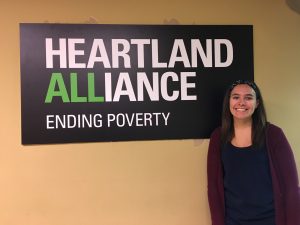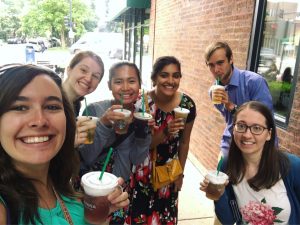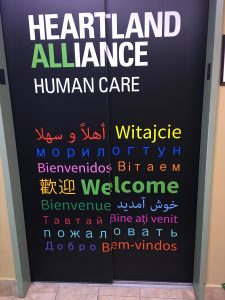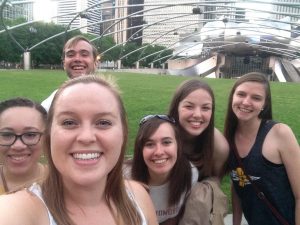 Wow, I can’t believe it’s already my last week at Heartland and in the Chicago area. I’m purposely refraining from reading my first blog post so that I can read both side by side and see how much I’ve grown.
Wow, I can’t believe it’s already my last week at Heartland and in the Chicago area. I’m purposely refraining from reading my first blog post so that I can read both side by side and see how much I’ve grown.
Because yes, I truly feel like I’ve grown. I remembered being intimidated and even a little terrified my first few weeks: there were so many heavy tasks I was thrown into with little to no instruction, so many language and culture barriers, so many weights I didn’t feel strong enough not to get crushed under. But now, I feel completely transformed. I’m proud to say that I’ve developed the skill of communicating effectively with non-English speakers to a level in which I consider it one of my strengths. I feel comfortable coming into the office each day instead of a little apprehensive. Both the newer interns and the refugees come to me to ask questions when the case managers aren’t around. I’ve even been sitting in the case managers’ desk area (because we have more interns than computers in the “intern cave” now, which is a great problem to have!), and the case managers talk to me like a co-worker. All of these have made me feel more a part of the team than ever, and it’s very empowering.
Not only have I experienced that sense of the empowerment myself, but I’ve had the joy of witnessing it among the refugees, too. I’ve been here long enough now to be able to see their growth over their first month or two here. For example, one of my jobs is to conduct home visits both their first 24 hours in the country and after their first 30 days. During the 24 hour visits, the refugees are often exhausted from travel, culture shocked, and afraid. They feel like a foreigner, a guest in our United States. During the 30 Day visits, however, I typically see a huge transformation. The refugees are happy, confident, and assertive. They consider me a friend. They open their homes to me, usually with great food and as much jovial conversation as they can manage at their English level. Now I am a guest in their home, their Chicago, their United States. They become free and autonomous, and while the road for them is anything but easy, they are able to taste their dream of living in a place where they are safe, loved, and accepted – a dream that we as lifelong US citizens so often take for granted.
 All of this will go with me even after I leave the office for the last time on Friday. My CAPS experience is occurring in the middle of my greatest life transition yet: In May, I graduated college, and said goodbye to Valpo as well as my friends, mentors, commitments and activities – really my whole way of life – there. In two weeks I leave the 60-mile radius of the Midwest I’ve lived in my entire life move to Denver, Colorado, a place where I’ve only spent about 36 hours total and know virtually no one. As of last week, my family officially completed their relocation to Charlotte, North Carolina, where my dad was transferred for work, so I also said goodbye to my childhood home, my hometown, and my old friends and neighbors. While navigating this huge life change in the midst of an experience where I must reflect on my calling and purpose in society, I have had another question thrown into the mix: who am I? When all of your roots are pulled from the ground – all of the places and activities that up until this point in your life made you who you are – what is your identity? I wish I had the answer for you. I do, however, have one valuable insight I want to share:
All of this will go with me even after I leave the office for the last time on Friday. My CAPS experience is occurring in the middle of my greatest life transition yet: In May, I graduated college, and said goodbye to Valpo as well as my friends, mentors, commitments and activities – really my whole way of life – there. In two weeks I leave the 60-mile radius of the Midwest I’ve lived in my entire life move to Denver, Colorado, a place where I’ve only spent about 36 hours total and know virtually no one. As of last week, my family officially completed their relocation to Charlotte, North Carolina, where my dad was transferred for work, so I also said goodbye to my childhood home, my hometown, and my old friends and neighbors. While navigating this huge life change in the midst of an experience where I must reflect on my calling and purpose in society, I have had another question thrown into the mix: who am I? When all of your roots are pulled from the ground – all of the places and activities that up until this point in your life made you who you are – what is your identity? I wish I had the answer for you. I do, however, have one valuable insight I want to share:
The experience of your life may be unique to you, but it is shared. It is shared with everyone you smile at on the street, everyone you commute with on the subway, everyone you dedicate your time to the same cause with. Every time you interact with someone, you are bearing witness to their story, and they yours. Community, I believe, is the essence of our existence as human beings. To love in all its forms is our calling, and to use our strengths to give, receive, and perpetuate that love in the biggest or smallest of ways is our purpose. My CAPS Fellowship – and my entire experience at Valpo, honestly – has helped teach me this.
I suppose the idea of CAPS is to figure out how you specifically fit into that grand idea of love and life. I don’t know if working with refugees is my entire life’s calling (if I even have an entire-lifelong calling), but it was this summer. God brought me here to do good work, and I did. Now, He sends me to Denver to do even more. I’ve started to turn away from the idea that we have one specific calling and one specific purpose. Last spring, my calling was to apply for CAPS. This summer, my purpose was to help resettle refugees. My current calling is to go to Denver and complete a Master’s program in International Disaster Psychology, and my purpose there will be revealed to me in due time. For now, I am endlessly thankful for my CAPS experience, and I’m beyond excited to take my new skills, experiences, and growth into my next chapter of life.
